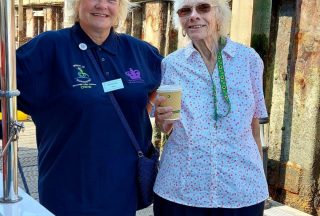Sandra cares for her husband, Ian, who was officially diagnosed with Alzheimer’s disease in November 2019. She says looking back though, there were signs that things weren’t right as long before this. Little things that to start with were dismissed as ‘temporary blips’ but eventually increased in intensity and frequency. Ian would suddenly get confused with which side of the road the car should be driven or not being able to work out percentages (even though he dealt with facts and figures in his job). He started to find it difficult to make any choices too and whenever the two of them ate out, he would automatically have what Sandra had chosen. Ian became very indecisive and started to rely on Sandra more and more. In the past, Ian had always taken care of finances.
Now, Sandra says, it’s a very different story. She sorts out all aspects of running the home, which includes the organisation of the house, all paperwork, bills and banking. Ian in appearances looks slim, fit and well but he needs help with everything. For example, he needs help washing and dressing even to know where to use shampoo and how to wash. He’ll need several reminders and needs to be watched as he uses a whole bottle of shampoo if not prompted, or none at all! Sandra has to lay his clothes out in the correct order of wear because he has been known to put a t-shirt on top of a jumper and he needs watching because unless the dirty clothes are put in the laundry bin, he will attempt to put them back on. The couple also have a dog and Ian needs to be watched around it as once he tried to give it soapy water to drink.
Ian was always good at DIY and would fix almost anything from designing architectural plans for extensions to laying foundations. So, Sandra now needs to watch that he doesn’t get into his head to things fix things as this can end up with gloss paint being slopped around or de-icer used to clean windows. At night Sandra is constantly on high alert too, for example, she has to supervise that toileting is done in the correct room and place. Basically Sandra has a 24/7 hour job looking after Ian.
The effects of lockdown
During lockdown, Ian just couldn’t understand what was happening, and every day he was asking why he couldn’t see people. When the two ventured out for walks he just didn’t understand ‘social distancing’. Sandra had to constantly guide and tug him away from people the whole time, which added further stress. Ian, even now, is a very social person and will talk to anybody.
Unfortunately, Ian has a very poor grasp of social rules and won’t understand when a total stranger is unwilling to engage with him. Ian also has limited use of language and forgets many key words making it difficult to make himself understood. His comprehension is worsening too, and Sandra now needs to use sign language in order to reinforce the spoken word. Sandra says, in terms of her own wellbeing, she was due to start a course in Wimborne, meeting other carers of dementia, for a 10 week block but the pandemic put that support on hold.
Since lockdown, Sandra says things have improved slightly. Ian is now playing walking football again twice a week. Sandra says, his absolute passion throughout his life has been football and that, as such, playing with men in their 70s and 80s has been a lifeline for him. Sandra’s son is able to take him for the hour session and then he brings him home and showers him, giving Sandra the smallest of breaks.
The constant caring for her husband is relentless for Sandra and has taken its toll. Sandra comments
‘I am quite a calm, placid person generally but there are times when I could just scream, and times when I get resentful. Some days I could just curl up and howl, but I can’t do that, I just have to get on as best as I can.’
At Sandra’s lowest point, Sandra describes plucking up the courage to ring Carer Support Dorset and speaking to one of Carer Support Dorset’s Carer Advisers. Sandra says, that she really listened to me at my lowest ebb and sent me a carer pack. Sandra describes how important it was that she finally felt valued and that someone was able to listen to her nonjudgmentally. Since then she has had several conversations with Carer Support Dorset’s Carer Advisers who she says exude a calm, reassuring manner and provide her with signposts to further courses, help and support.
Sandra adds ‘Knowing that I can speak to someone at the end of the line or email has been a lifeline. I was pretty down when I made that first phone call, but I’m so glad that I did.’



